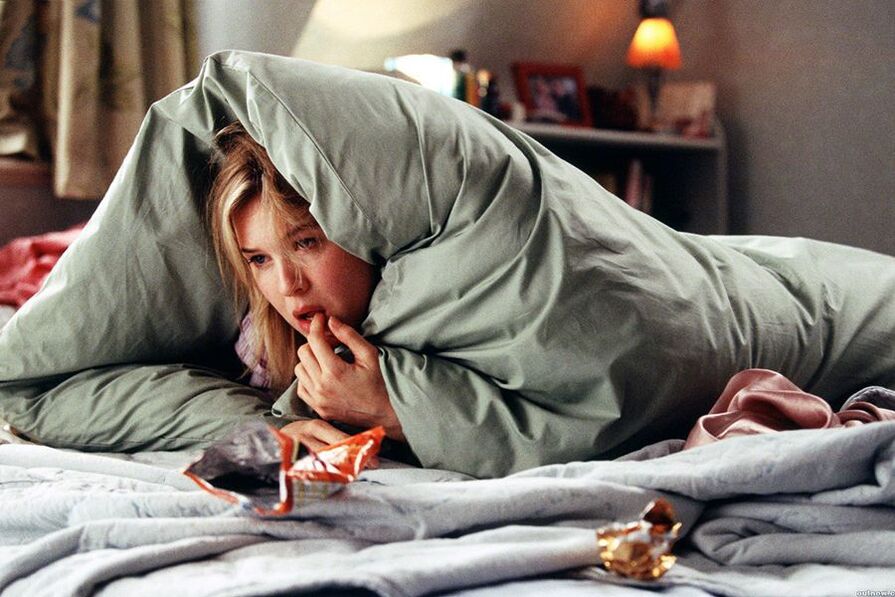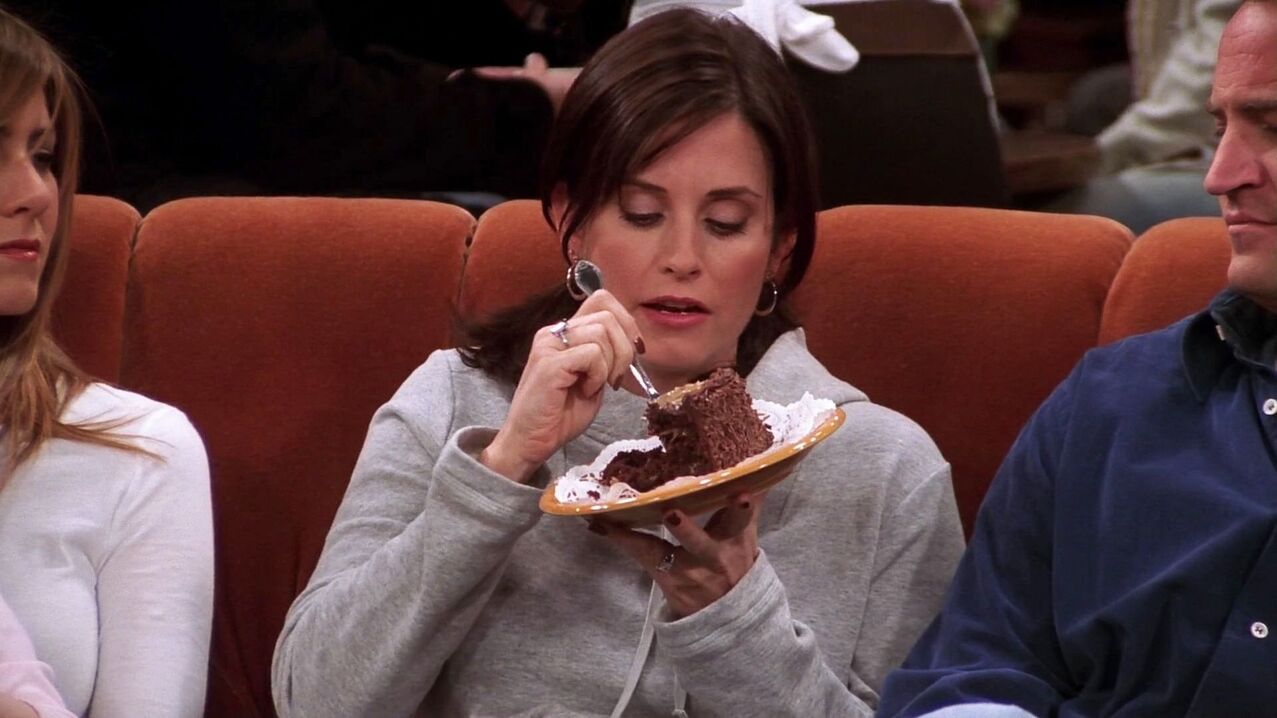
The title contains a popular query in search engines. But this article will not offer tips like "Count to 10 and Drink a Glass of Water". Let's talk about something else: why force yourself not to eat to lose weight is a bad idea and how to deal with your attitude towards food.
What's wrong with not eating for weight loss?
Practitioner psychologist: If you have a healthy attitude towards nutrition, then you are in contact with your body - you hear its signals and you know how to negotiate. If the body gives a signal of hunger, you meet it; Saturation, you stop eating. The message "do not eat to lose weight" means breaking this contact, confronting yourself and manifesting self-aggression. It turns out that in order to achieve the goal (weight loss) you take measures against yourself.O.Boring and unhealthyO.in.
Psychiatrist: Most people who have lost weight as a result of a restrictive diet return to it within 1-2 years. Moreover, 2/3 of them get more than they lost.
Endocrinologist:The message to force yourself not to eat in order to lose weight is irrational. It is important to understand: What happens to the body? Maybe it is not a matter of malnutrition but of hormonal characteristics.
And what is it all about - a healthy attitude towards food?
Psychiatrist: This is a case where regular meals and snacks are not accompanied by anxiety, shame and feelings of guilt. Lack of "forbidden foods", diet and counting calories. And when you allow yourself to enjoy food.
Endocrinologist:This refers to food as a condition of a full, happy life. And not as a substitute for joy and pleasure.
Practitioner psychologist: This is when you are starving, stop when you are full, do not focus on the body's deficiencies, which must be "corrected" by food or give it up when you do not eat too much, do not assimilate emotions.
Can you give us more details? How and why do we eat emotions?
Practitioner psychologist: There are no good and bad emotions for the psyche, it can handle anyone. For this he does not need food, alcohol, gadgets or a TV. But there are situations when a person suppresses his emotions with food. Annoyed, I ate a cup of ice cream - it just got easier. His behavior received positive reinforcement and people started using this strategy again and again.
Consultant Psychologist:Often people overeat because they have no rest. Let me give you an example. The young woman had a problem: she eats a lot in the evenings and can not restrain herself. It turned out that he works for three because he does not know how to give up on colleagues. No time for biting: always business. And in the evening he can not eat. That is, a person is depressed, overworked, constantly stressed. How to replenish lost energy? Burger, potatoes, chocolate.
It turns out that if a person eats during boredom, anxiety, rage, fatigue or boredom, is that wrong?
Consultant Psychologist:In itself, this is neither good nor bad: food is subconsciously associated with safety. Food for the newborn is not only food, but also closeness to the mother, calmness, self-confidence, acceptance, love, communication. Adults also sometimes eat to relax. Bad when it's the only way to overcome anxiety or fear.
Psychiatrist: We meet different psychological needs with food. For example, having dinner with family is an intimate relationship. Going to a restaurant with friends closes the need for social interaction. The problem arises when food becomes the crutch of our negative experiences. This leads to the topic of eating disorder (EID) or eating disorder. Psychiatry solves these problems.
ᲛWait Wait! It turns out that if I ate a bar of chocolate and felt guilty - is it already a mess? Did I go directly to a psychiatrist?

Practitioner psychologist:A complex issue. There are situations when a person eats while running away, chaotically, not paying attention to what he is eating. Or he eats when he is not really hungry - out of boredom or for company. It may just be a eating disorder that can be corrected with a dietitian. But, at the same time, eating beyond hunger is one of the symptoms of RIP. The line is very thin. And only a doctor can determine that. In our country, psychiatry is busy with this.
Endocrinologist:It happens that a person is constantly bored, worried, tired - and grabs these problems. Maybe it's the result of constant stress. But they are also symptoms of endogenous depression and anxiety neurosis. A psychiatrist is also involved in the diagnosis of such a condition.
But is not ERP bulimia and anorexia? It is difficult to confuse the symptoms
Psychiatrist: It's not just bulimia and anorexia. Eating disorders also include psychogenic overeating (also called paroxysmal or compulsive), malnutrition (peak illness), and psychogenic loss of appetite. These are diseases that are included in the International Classification of Diseases (ICD). However, there are disorders that are not included in this list, but also capture the attention of psychiatry: selective eating disorder, orthorexia (when the desire for a healthy lifestyle goes beyond all bounds) and pregorexia (the strictest restrictive diet in pregnant women). .
Practitioner psychologist: Psychology also distinguishes between overeating syndrome (BOE): When a person eats almost nothing all day, he can not sleep for a long time, or often wakes up and goes to the refrigerator as soon as he wakes up.
Is obesity also an ERP?
Psychiatrist: not always. There are many possible causes - these are genetics, seductive lifestyles and hormonal disorders. RPP can not be equated with obesity.
Practitioner psychologist: ახYes, I agree. There are people with absolutely healthy eating behaviors who are overweight. And it does the opposite - for example, patients with anorexia nervosa.
Did you hear that the RPP problem mainly affects women, adults and models? ალიაIs it true?

Psychiatrist:Of course no. The disease can develop at any age, both in men and women. For example, selective eating disorder most often affects children - the child eats only certain foods.
Practitioner psychologist: Anorexia and bulimia are more common in women. But forced overeating - equally in men and women. So it is impossible to say that RPP is just a woman's problem. Yes, teenagers, models, athletes involved in aesthetic sports (rhythmic gymnastics, figure skating, sports dancing), TV presenters, bloggers, actors - all those who are considered and whose work depends on appearance are at risk. But the problem can be overcome by any person, including those who are far from the modeling business or beauty blog.
It is believed that any eating problem is an attempt to attract attention. This is true?
Practitioner psychologist: There is such an opinion, but it is not scientifically substantiated. Yes, during therapy it may turn out that RPP started when the person was not taken by peers. For example, for a 13-15 year old girl it is important that the boys look at her and her friends like her and so she went on a strict diet. It also happens that the food problem is the child trying to attract the attention of the parents, often unconsciously. But these are quite special cases. It is a misconception that the need for attention is a major cause of eating disorders.
So what is the reason?
Practitioner psychologist: There are three groups of causes: biological, psychological and social. Biological - for example, genetic predisposition to RPC - can unfortunately be inherited. Psychological - domestic violence, prohibition of negative emotions, disruption of parent-child relationships (for example, if the child has cold, reserved parents). Social - the cult of ideals of beauty, slimness, bullying.
PsychiatristAnswer: There are certain personality traits that can contribute to the development of EID, such as perfectionism or hyperresponsiveness. Also affects the peculiarities of eating behavior in the family, attitudes towards weight and figure. A child could be rewarded with sweets for good behavior and learning, and it happened: because I'm good, you can get sweets. Very good? I will take ten.
Consultant Psychologist:Many patients with ECD have experienced physical or sexual abuse. For many, food also contributes to the secondary benefits of the situation. For example, one of my clients needed weight to protect herself from men. In the course of therapy we found out that a school-age girl got into an unpleasant situation with an adult male. The client was surprised to remember this: the story seemed "forgotten" but continued to affect the girl's behavior in adulthood. They also expressed the belief that men only love skinny.
How common are eating disorders in the community?

Psychiatrist: It is estimated that the prevalence of RPC in the world is about 9%. The prevalence in risk groups is higher. There are studies of adolescent girls who report that about 13% of 20-year-olds have CRP symptoms. Anorexia is one of the most deadly mental disorders of all time and is caused by chemical addiction.
Practitioner psychologist: It is difficult to give exact numbers because people with PAD often do not realize that they need help. There are numbers for the United States because it is the Center for Eating Disorders Research and Statistics: About 30 million people live with eating disorders. Twice as many women as men (20 million vs. 10 million). And every hour at least 1 person in the world dies as a result of RPE.
What are the symptoms of RPE? Can I diagnose it myself?
PsychiatristIn general, the main symptoms are as follows:
- A person vomits after eating or compensates for what he has received in other ways, for example, through excessive physical activity (physical tyranny), laxatives and diuretics.
- Strong fixation on weight and figure (you can not add / lose one gram or centimeter! ).
- Many attempts at weight loss and body weight change.
- Many rules of nutrition (I eat only proteins, only vegetables, only red).
- Constant thoughts, fears, and feelings of guilt and shame related to food intake and body weight. When food-related thoughts and behaviors bring great suffering.
- Loss of control over the amount of food.
But many may have such symptoms to varying degrees. Is there a more accurate diagnosis?
Endocrinologist:RPD is a systemic chronic disease. It causes metabolic changes in systems and organs, changes in human neurohumoral regulation. It is a complex problem that can manifest itself in neuroses, organic pathologies of the brain, organic lesions, and depressive disorders.
But first you need to determine the cause of the symptoms. For example, if a person runs away from the refrigerator at night, glycogen levels should be checked to rule out insulin resistance and type 2 diabetes.
What if you hear that you or your loved one has an RPP?
Practitioner psychologist: If you have - consult a psychiatrist for a diagnosis. If you suspect a RPP in a loved one, it makes it harder: he often refuses, unwilling to admit he has something wrong. And unnecessary pressure can break trust. Let your loved one know that you are by their side, ready to help and support them.
Who treats ECD? Only a psychiatrist?
Psychiatrist: No. The psychiatrist makes the diagnosis. And he cures, according to the disease, a psychiatrist, a psychotherapist, a clinical psychologist (prescribed by a psychotherapist). Why is a visit to a psychiatrist so important in the first place? Because it can reveal accompanying conditions such as depression or anxiety disorder, which are found in about 80% of cases in people with RPD. Treatment depends on the severity of the disease. It can be drug therapy in combination with psychotherapy (group, cognitive-behavioral, dialectical behavior). Family therapy is also recommended.
Consultant Psychologist:Anorexia and bulimia are mainly treated by a psychiatrist. Emotional overeating - psychologist, counseling psychologist. Obesity - Dietitian-endocrinologist (hormones should be checked to see if metabolism is disturbed) with a psychologist or psychotherapist.














































































